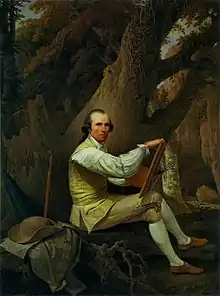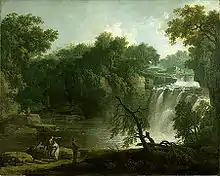Jacob More
Jacob More (1740–1793) was a Scottish landscape painter.

Self-portrait, 1783, Uffizi

The Falls of Clyde (Corra Linn)
Biography
Jacob More was born in 1740 in Edinburgh. He studied landscape and decorative painting with James Norie's firm. He took the paintings of Gaspard Dughet and Claude Lorrain as his models.
By 1773 More had settled in Italy, and spent the rest of his life there; but he exhibited Italian landscapes at the Royal Academy in London in the 1780s.
In 1787 he was visited by Goethe, who considered his work 'admirably thought out'.
In 1791 he moved to Rome. In Italy he rivalled Jacob Philipp Hackert; and he befriended Allan Ramsay (1713-1784). In Rome he enjoyed a high reputation, and was commissioned to design a garden for the Villa Borghese in the Scottish landscape style.
Some paintings on view in Britain
- Mount Vesuvius in Eruption: The Last Days of Pompeii (1780), National Gallery of Scotland, Edinburgh
- The Falls of Clyde (Corra Linn), National Gallery of Scotland, Edinburgh ( a painting previously owned by Sir Joshua Reynolds)[1]
- Bonnington Lynn, Fitzwilliam Museum, Cambridge
- Falls of the Clyde, Tate gallery, London
- The Good Samaritan, McManus Gallery, Dundee
Further reading
- P. R. Andrew, 'Jacob More, Biography and a Checklist of Works', in The Fifty-Fifth Volume of the Walpole Society (1989)
- J. Holloway, Jacob More 1740-1793 (1987)
References
| Wikimedia Commons has media related to Jacob More. |
- The National Gallery of Scotland, accessed May 2010
| Wikisource has original text related to this article: |
This article is issued from Wikipedia. The text is licensed under Creative Commons - Attribution - Sharealike. Additional terms may apply for the media files.
